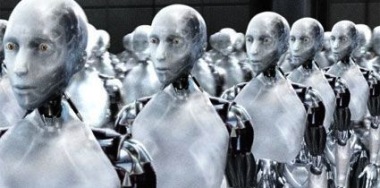Robots Are Alive And Well And Living In My House

This is really a follow on thought from the previous post about how the businesses of tomorrow will look more like a collection of integrated software programs than the classic image one has of businesses as groups of people working inside office buildings.
Back in the 1950s, western societies began to imagine the nascent utility of robotics as being something that possessed so much promise and whose prevalence would quickly become so pronounced that if we were to travel back in time to the 1950's, a random chap on the street would react with incredulity if we told him that we still didn't have robots in every home attending to housework by 2012.
The rise of a robot workforce was a logical if wrong-headed prediction to make, at least aside from their successful deployment on factory floors and industrial production lines. And it's another great example of how we initially perceive the innate usefulness of innovations through a lens that's governed by history rather than in a futuristic, abstracted sense.
So, while the rise of the the microelectronics revolution required to make robots spark into life was certainly accurate, the humanoid form its application would take was not.
And predicting we'd build anthropological form factors into which we'd pour the emerging electronics wizardry speaks more of 1950's society than the actual practical sense of consumer robots. Post-war popular culture is remembered for many things, but not least for its blossoming admiration for science fiction borne of an optimism to build a brave new utopia, free from war but set amid the context of a broader society that still operated on rules and principles from the Victorian industrial engineering era.
In that particular cultural petri dish it was therefore entirely logical that we'd naturally propagate the notion of perfectly utopian robot beings attending to dirty work we no longer cared much to do. Plus, we mostly perceived our 1950's world through the eyes of a mechanical engineer; ergo we easily imagined perfectly polished and engineered, intelligent robots.
Roll on sixty-odd years and robots are as prevalent in our society today as they were in the 1950's. So, what happened?
There's an extent to which one might be forgiven for feeling disappointed that we're not waited on hand and foot by shiny slaves, as if we've underacheived. Though while the anthropological form factor prediction was clearly wrong, I think everything else was more or less right. We just didn't possess the faculties to imagine how we'd deploy our new found automated intelligence.
Today's robots are just invisible software processes that manifest themselves in mostly mundane ways. They organise the processes that result in the things we purchase from Amazon landing on doorsteps the following day and they can deliver a million emails at the click of a single Send button or just wash our clothes to perfection.
Our 1950's robot future is alive and well and thriving in 2012, only they don't walk among us as much as we walk among them. They don't shake your hand with a clumsy metallic grip but they're just as polite, "Welcome to [Service Name], we're so glad you selected us, please be assured we won't disappoint you…", and they don't gently tap you on the shoulder while you're reading your sunday supplement to remind you that your TV license is about to expire, but they let you know all the same.
So, while we certainly built the complex software required to automate our robot society, we just chose to embed it in mostly abstract ways. Prior generations simply couldn't envision a utopian future that didn't manifestly feature hard engineering as the most likely conduit for the coming technological revolution.
But it's still here all the same, only in disembodied spirit form.


Reader Comments